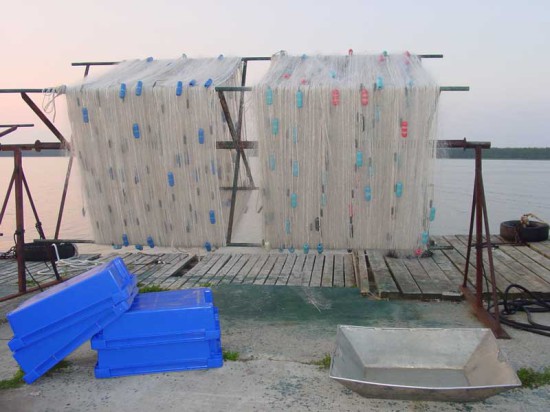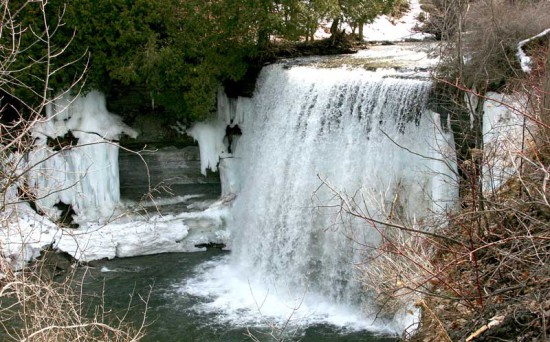BURNT ISLAND—The province of Ontario, through the Ministry of Natural Resources (MNR) and the Chippewas of Nawash Unceded First Nation and Saugeen First Nations (collectively the Saugeen Ojibway Nation (or SON), should have brought forward a proposed commercial fishing agreement it reached to commercial fisherman in the area prior to writing the agreement. This would have alleviated concerns with the area that is being fished by the First Nations, which is also an area that Purvis Brothers Fisheries has a permit to fish, a representative of the company told the Recorder last week.
“The line where we run across and have permission to fish is at the bottom end of the ferry dock at Tobermory, and we can fish right to the dock, at the bottom end of the Georgian Bay zone in the new agreement. It goes pretty much to Yeo Island, just south of Fitzwilliam Island, so there is overlap from Yeo Island to Tobermory of where we can fish and the agreement stated SON can fish,” stated Drew Purvis, of Purvis Brothers Fisheries last week.
“They should have included us in the discussion, and asked if we had any concerns or questions and we could have told them about this concern then, not after the agreement is in place,” said Mr. Purvis. “I read the agreement and all it would have taken is consultation; we might never be down there to fish anyway but if we do, unfortunately it could come to disputes, because non-SON fishermen are not supposed to be in this area, according to the agreement.”
And with the agreement between Saugeen and the MNR, “it means the MNR basically took roughly $200,000 from Ontario Commercial Fisherman Association (OCFA) funding,” said Mr. Purvis. “Because of this we had to lay off two people in our Lake Erie area. Instead they turned around and gave the First Nations this funding in this agreement,” he said, noting what looks like a reallocation and adding that the Saugeen First Nation does not have any fish quotas on any species caught except for whitefish.
“The fact that the MNR has taken money away from our group (OCFA) is a slap in the face, the MNR has already been recouping funds from the program we run for them, we pay a royalty for every pound of fish we take,” explained Mr. Purvis.
“But my biggest concern is that where they have been granted permission to fish overlaps part of the area that we already have permission to fish in,” said Mr. Purvis. “The MNR obviously never thought of the fact that we have permission to fish there and always have. The agreement should have at least included consultation with the people that already fish in the area.”
Mr. Purvis said the final agreement announcement was also somewhat of a surprise. “They (MNR) always said they were negotiating with the Native bands, but what they were working on they would never tell us. Even the Conservation Officer (CO) who takes care of the commercial fishery on the north end of the lake didn’t know about the agreement having been reached.”
“Another concern I have with the agreement is a clause about halfway through the agreement, on compliance, says if non- SON fishermen are impeding the rest of the fisheries they can sue them and take them to court on this. I’m a non-SON fisherman,” said Mr. Purvis.
“With all of these concerns, we should have been consulted and involved in the process, or consulted for our input once the agreement was drafted,” added Mr. Purvis. “That way the agreement would have been written right the first time, now they are going to have to make changes to the agreement.”
The five-year agreement covers areas recognized by SON as traditional waters. Waters surrounding the Bruce Peninsula from Point Clark in Lake Huron to the international border and around the Bruce Peninsula into Georgian Bay to Craigleith. The area takes in Owen Sound and Colpey’s Bay in Lake Huron, the latter inside the solid line running from Gravelly Point on a line of sight through Skinner’s Bluff.
Under the agreement the MNR will provide SON up to $850,000 over a five-year term of a new substantive commercial fishing agreement. For the first year April 2012 to March 2013, $250,000 is being provided, while for the next four years the amount is $180,000, $170,000, $150,000 and $100,000.
The goals, principles, objectives and commitments between the parties in the agreement states: “To create a constructive, ongoing and harmonious, long-term relationship between SON and MNR by reaching agreements regarding the fishery and the watershed defined in the terms of the Substantive Commercial Fishing agreement. To accomplish this long-term relationship, the parties will engage in good faith to implement this framework agreement and the commitments made herein. The results of the implementation of and work under this framework agreement will be the basis for a long-term substantive commercial fishing agreement arrived through good faith negotiations, mutual commitments and shared obligations. The parties understand that this framework agreement, and any substantive commercial fishing agreement that results, are part of a continuum of building and maintaining a new and positive relationship.”
“The MNR and SON will monitor commercial fishing and recreational use in the bays and will meet in October 2013 to make sure that both commercial and recreational anglers can continue to safely co-exist, while maintaining a sustainable fishery,” an MNR release states.
“MNR will continue to seek input on the management of the fishery through fisheries management zone councils (groups made up of 15-20 volunteers representing a variety of stakeholders and interest groups) and meetings with our partners,” MNR spokeswoman Jessica Spindler told the Owen Sound Sun Times in a March 11, 2013 article.
Ms. Spindler said there are provisions in the agreement to help ensure both kinds of fishing (commercial and recreational) can co-exist safely in the bay, including requirements that commercial nets have standardized marking and nets won’t be longer than 300 metres to maximize marker visibility and those in the bays will have mesh of 4.5 inches (11.5 centimetres) or greater.
“The SON agreement recognizes the importance of both commercial fishing and recreational activities, such as angling and boating, and will provide certainty and clarity on the management of fisheries in the Bruce Peninsula area,” Minister of Natural Resources David Orazietti said in a ministry news release.





